
Went the Day Well? is a 1942 British war film adapted from a story by Graham Greene and directed by Alberto Cavalcanti. It was produced by Michael Balcon of Ealing Studios and served as unofficial propaganda for the war effort. The film shows a Southern English village taken over by German paratroopers, reflecting the greatest potential nightmare for the British public of the time, although the threat of German invasion had largely receded by that point. The film is notable for its unusually frank, for the time, depiction of ruthless violence.

Consuming Passions is a 1988 black comedy film which stars Vanessa Redgrave, Jonathan Pryce, and Sammi Davis and was directed by Giles Foster. The film is based on Secrets by Michael Palin and Terry Jones, a BBC television play broadcast in 1973.

A Kind of Loving is a 1962 British kitchen sink drama film directed by John Schlesinger, starring Alan Bates and June Ritchie. It is based on the 1960 novel of the same name by Stan Barstow which was later adapted into the 1982 television series A Kind of Loving. The film tells the story of two lovers in early 1960s Lancashire. It belongs to the British New Wave movement.

Bitter Harvest is a 1963 British kitchen sink drama film directed by Peter Graham Scott and starring Janet Munro and John Stride.

Term of Trial is a 1962 British drama film written and directed by Peter Glenville and starring Laurence Olivier, Simone Signoret, Sarah Miles, Terence Stamp, Hugh Griffith, Roland Culver, Dudley Foster and Thora Hird. It was produced by James Woolf for Romulus Films, with James H. Ware as associate producer. The screenplay was based on the 1961 novel of the same name by James Barlow. The music score was by Jean-Michel Damase and the cinematography by Oswald Morris.

Joy Winstanley Shelton was an English actress who performed in films, radio and television.

Ronald James Marsh, was a British author who was born in Broadstairs in Kent and spent much of his life in Rochester, where he was City Librarian. The son of Donald Alfred Sackett Marsh and Helen Cicely Perkins, he was born on 7 August 1914 and died aged 72 in Chatham, Kent, on 11 January 1987. He married first in Thanet in 1936, Maud Ethel Chandler and second in Oxford in 1947, Phyllis Glenice Higgins.
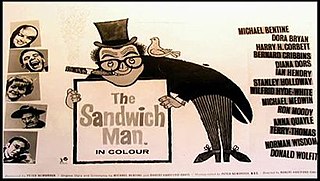
The Sandwich Man is a 1966 British comedy film directed by Robert Hartford-Davis starring Michael Bentine, with support from a cast of British character actors including Dora Bryan, Harry H. Corbett, Bernard Cribbins, Diana Dors, Norman Wisdom, Terry-Thomas and Ian Hendry. It was written by Hartford-Davis and Bentine.

Emergency Call, released in the US as The Hundred Hour Hunt, is a 1952 British drama film directed by Lewis Gilbert and starring Jack Warner, Anthony Steel, Joy Shelton and Sid James. It was distributed by Butcher's Film Service. The film was a noted success compared to its small budget and helped establish Gilbert as a director. It was remade in 1962 as Emergency.

The Shakedown is a 1959 black and white British crime-drama film directed by John Lemont, starring Terence Morgan, Hazel Court, and Donald Pleasence. A ruthless crook runs a blackmail operation, falls for an undercover cop, and is murdered by one of his victims.

The Magnet is a 1950 British black and white comedy film directed by Charles Frend, featuring Stephen Murray, Kay Walsh, and in his first starring role James Fox. A young Wallasey boy obtains a magnet by deception, leading to much confusion. When he is acclaimed as a hero, he is shamed by his own sense of guilt.

Boys in Brown is a 1949 black and white British drama film directed by Montgomery Tully, which depicts life in a borstal for young offenders. It stars Jack Warner, Richard Attenborough, Dirk Bogarde and Jimmy Hanley. It is based on a 1940 play by the actor Reginald Beckwith.

They Came to a City is a 1944 British black-and-white film directed by Basil Dearden and starring John Clements, Googie Withers, Raymond Huntley, Renee Gadd and A. E. Matthews. It was adapted from the 1943 play of the same title by J. B. Priestley, and is notable for including a cameo appearance by Priestley as himself.
Once a Jolly Swagman is a 1949 British film starring Dirk Bogarde, Bonar Colleano, Bill Owen, Thora Hird and Sid James. It is centred on the sport of motorcycle speedway racing, which was at its peak of popularity at the time. It was released in the U.S. as Maniacs on Wheels. The film is based on the 1946 novel by Montagu Slater.
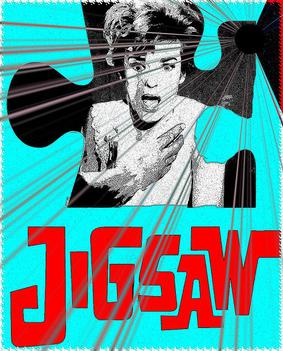
Jigsaw is a 1962 British black and white crime film directed by Val Guest and starring Jack Warner and Ronald Lewis. The screenplay was by Guest based on the 1959 police procedural novel Sleep Long, My Love by Hillary Waugh, with the setting changed from the fictional small town of Stockford, Connecticut, to Brighton, Sussex, while retaining the names and basic natures of its two police protagonists and most of the other characters.

Time Gentlemen, Please! is a 1952 British comedy film directed by Lewis Gilbert and written by Val Valentine and Peter Blackmore. The cast includes Eddie Byrne, Jane Barrett and Raymond Lovell. It was produced by Group 3 Films with funding from the NFFC and distributed by ABPC. It was shot at Southall Studios and on location at Thaxted in Essex. The film's sets were designed by the art director Michael Stringer. The film is based on the 1946 novel Nothing to Lose by R.J. Minney.

These Dangerous Years is a 1957 British drama musical film directed by Herbert Wilcox and starring George Baker, Frankie Vaughan, Carole Lesley, Thora Hird, Kenneth Cope, David Lodge and John Le Mesurier. It was written by Jack Trevor Story,
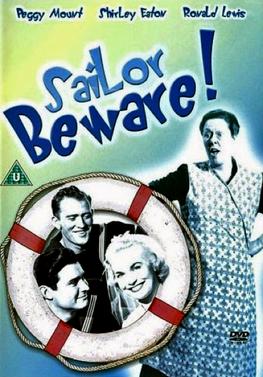
Sailor Beware! is a 1956 British comedy film directed by Gordon Parry and starring Peggy Mount, Shirley Eaton and Ronald Lewis. It was released in the United States by Distributors Corporation of America in 1957 as Panic in the Parlor.
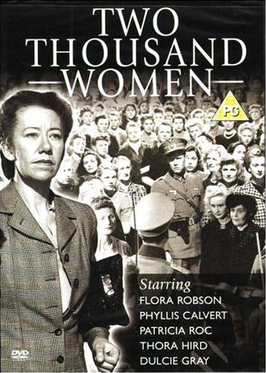
Two Thousand Women is a 1944 British comedy-drama war film about a German internment camp in Occupied France which holds British women who have been resident in the country. Three RAF aircrewmen, whose bomber has been shot down, enter the camp and are hidden by the women from the Germans.
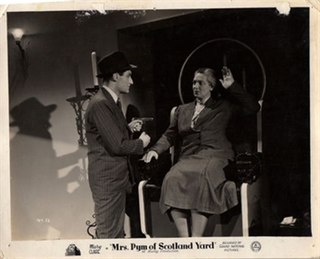
Mrs. Pym of Scotland Yard is a 1939 British comedy-drama film directed by Fred Elles starring Mary Clare in her only title role and Nigel Patrick in his film debut. It is based on the Mrs Pym novels by Nigel Morland, and written by Morland, who re-used the title for a 1946 book.



















